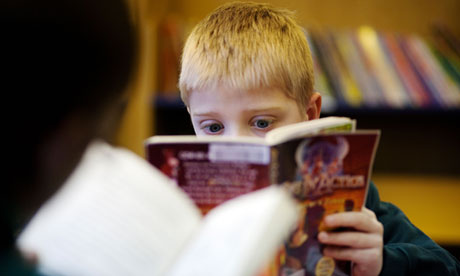Boys and reading! Plucking hen’s teeth or getting blood out of a stone are some of the comments you’ll hear from teachers and parents when discussing trying to get boys to read. Look at any group of kids and you’re likely to see a girl with a book in hand whilst for a boy it’s likely to be a ball, a toy car or a model soldier or alien.

This has always been the case and the outcome of it is that boys fare less well in reading assessments than girls leading to regular comments in the media that boys are ill-prepared for life outside of school.
Reading is a vital skill for it is the key that unlocks learning meaning that boys’ lack of reading skills cascades into other areas of learning, reducing accessibility and ultimately leading to low achievement.
It doesn’t have to be like this though; all it needs is an understanding of boys’ reading needs and addressing them. Formally it can be done through the Collins Big Cat scheme where as a whole, there is a balance of books that will be of interest to boys and girls but specifically Collins have collated their titles that cover boys’ interests so, if you want to set up a unit that seeks to improve boys’ reading skills, you can order a set of books dedicated for the task.
The key is to understand the kinds of reading that boys need and then broaden their experiences from there. Studying boys and their reading, it’s been discovered that action, sport and comedy comics, instructions, non-fiction on topics such as dangerous animals, structures, disasters, transport and war, all appeal. Fiction is less popular which is why reading schemes have to stick initially to topics that are solidly boy orientated such as ghosts, sport or spies.
You’ve only got to look at young teen boy fiction such as Lionboy, Artemis Fowl and Alex Rider to see what boys of that age will read. The difficulty there is that boys read in a limited genre which then also limits their creative writing range. It also limits their emotional development, further reinforcing the stereotype.
Electronic devices for reading, which some say are no substitutes for real books, are also motivational for boys and are particularly useful with their in-built links to dictionaries and encyclopaedias. Any chance for a boy to use a computer, tablet or Kindle and they’ll jump at it, even if it’s reading. Multimedia reading opportunities such as those on the free website Myths and Legends from E2BN which has animated stories with text that can be read to you and also offers the chance to add to stories or create your own.
You can get boys to practise reading without them realising it in a variety of ways. Set up trails around school or the classroom that give them instructions to follow. Ask them to find a new game to play, including the instructions and explain it to a friend. Ask parents for old copies of football or car magazines. Initial reactions are usually that the text is at too high a level but you’d be surprised what boys can read when they want to.
Web trails, properly prepared, are another good way to encourage reading, especially when the subject matter is focused on their interests. Boys also love lists and facts. Top Trumps games are not only good for reading but also for data analysis too.
Boys are good candidates for ‘Reading All Around Us’ because of the less concentrated nature of the task. From shop names, street signs, advertising hoardings and more, all offer opportunities for decoding and reading for understanding.
You can also enlist the help of your local library and their reading reward schemes which, whilst not always 100% effective, is worth trying.
Helping boys to read and then love reading is a tough task but using a range of ideas and opportunities, backed up with dedicated reading schemes such as the Collins Big Cat books for boys range, you’ll soon see results.



